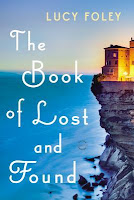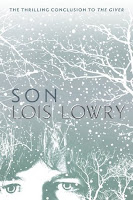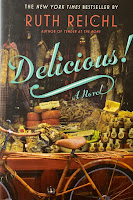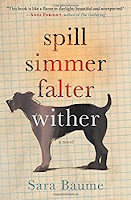The Book of Lost and Found by Lucy Foley
It's been a while since I read this and I've forgotten a lot of the details, but I remember enough to know that it was a pretty good story and I liked it.The Book of Lost and Found
Messenger, by Lois Lowry (#3) and Son, by Lois Lowry (#4)
Mattie and the blind man (Kira's father) have made a home together in Village, a place where everyone, damaged or whole, is accepted and valued. Here people have always lived in harmony and contentment, but Mattie is beginning to sense changes in attitudes. Selfishness is creeping in, and at the Trade Mart people are trading their better natures for material gain. Villagers, who were once outsiders themselves, begin to feel resentful of newcomers and want the borders closed, for the first time in Village's history shutting out people seeking help and a safe place to stay.
The Forest outside is deteriorating, too, and grows hostile to travelers just as Mattie sets out on a journey to bring Kira to her new home. It becomes clear that Forest does not want them to reach their goal.
At 142 pages this is the shortest of the four books but I think I liked this story best of the three. I'm looking forward to seeing how it all turns out in the last book, Son.
Although I found Claire's story interesting, and it was good to get answers to a lot of questions left by the other books, I didn't enjoy this one as much as the others. Toward the end the characters begin to feel more like clichés than real people, and the final resolution seems almost too easy after all the struggle to get there.
Overall I quite liked this series and recommend it to anyone who finds dystopian societies intriguing.
Gathering Blue-The Giver Quartet#2
The second book in The Giver Quartet seems to have no connection to the first one. Both are set in dystopian futures, but in different villages with different characters and different cultures. In this one Kira, a young girl with a bad leg, attends a hearing to find out if she will be allowed to stay in the village or if she will be left in The Field to be "taken by beasts". People with disabilities are considered useless and Kira would have been sent to the field as baby - because in this village that is "the way" - but for her influential grandfather who made an exception for her. Now, with her grandfather and both parents gone, she is alone with no defender.
Delicious!
Delicious! by Ruth Reichl
After dropping out of college, Billie Breslin lands a job as Assistant to the Editor of Delicious! magazine, the top foodie publication in New York City. She settles in well, making friends and enjoying the work, until the magazine is suddenly shut down by its owners. Though everyone else is now out of work, Billie is asked to stay on for a time to fulfill a corporate legal obligation, taking calls from disgruntled customers who are unhappy with the way the magazine's "guaranteed" recipes turned out.Billie and Sammy, the magazine's travel writer who has just returned to find the office all but empty, conspire to enter the locked upstairs library that has always been firmly off limits to employees. Inside, hidden behind shelves, they find the door to a secret room. In this room are decades of letters from Delicious! readers, among them some from Lulu, a young girl who corresponded with chef James Beard throughout WWII. Fascinated by Lulu's story, Billie and Sammy set out to track her down and find out what happened to her when the letters stopped.
The plot had potential but it went in too many different directions and tried to make all of them equally fascinating. In the end it's hard to say which is the main storyline.
Some of the situations seemed implausible, like Billie having a fear of cooking because of an unnamed (until much further along) trauma concerning her sister. Even when it becomes clear what happened, the fear of cooking/kitchens doesn't make sense. And then there's the very complicated system used for hiding the letters that seems unlikely and without any real purpose. Add to those a lady who keeps calling the office to complain about the recipes; she's entertaining until she does a startling about turn, behaving like a different person entirely.
Some of the characters felt like stereotypes: the tough-on-the-outside, soft-on-the-inside Deli owner who takes Billie under his wing, the irritating man she at first doesn't like then ends up falling for, and Billie herself, quirky, charming and adored by everyone she meets.
A few pages in I thought it might be a fun, light read, instead it felt contrived and over the top. Maybe there were too many characters and too many stories being told to do any of them real justice.








